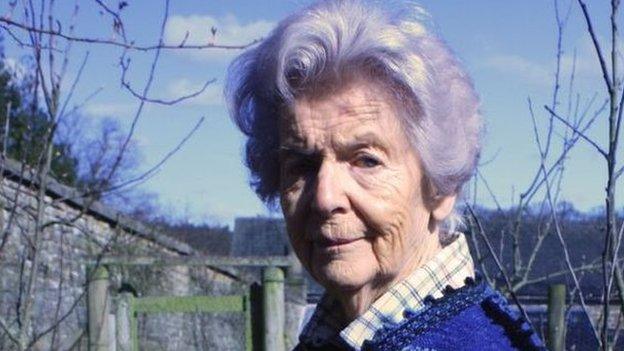Obituary: Dowager Duchess of Devonshire
- Published
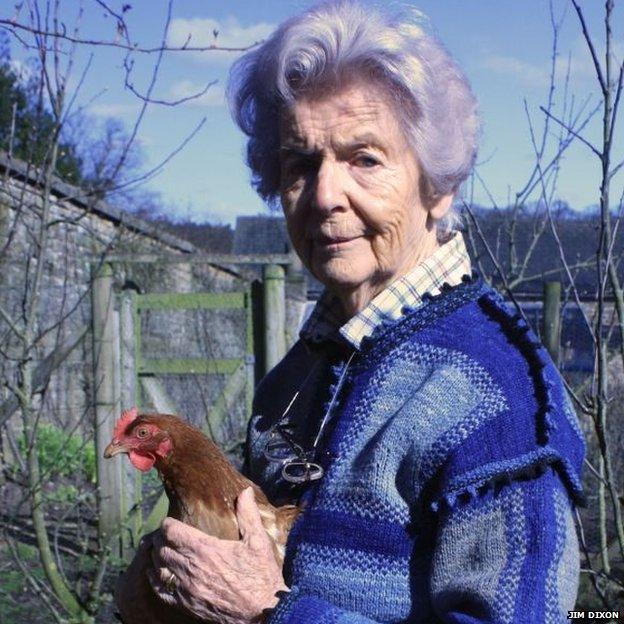
Deborah Devonshire was the astute chatelaine of Chatsworth House for more than half a century.
She was also the last of the fabled Mitford sisters, whose doings fascinated - and sometimes scandalised - society in the 1940s.
Deborah had a refreshingly homespun outlook on life, unlike Hitler's acolyte Unity, left-wing polemicist Jessica and Diana - second wife of British fascist leader Sir Oswald Mosley.
Nicknamed the "housewife duchess", she made Chatsworth one of the most successful and profitable stately homes in England.
The Honourable Deborah Vivien Freeman-Mitford was born on 31 March 1920, the sixth daughter of the 2nd Baron Redesdale.
The Mitfords' childhood, immortalised in her sister Nancy's novels, The Pursuit of Love and Love in a Cold Climate, was the quintessence of British eccentricity.
Her parents made a poor job of hiding their disappointment that Deborah hadn't been born a boy, leaving their son Thomas the only male in the brood.
Deborah spoke with the same distinctive Mitford voice as her sisters, reports the BBC's Nick Higham
Their father disapproved of educating girls, famously insisting that hockey would make their ankles fat, so Deborah spent most of her formative years skating and hunting.
She was brought up at the Mitford home in the Oxfordshire village of Swinbrook and was distraught when the family moved in 1936.
Her sister Unity's infatuation with Hitler saw the young Deborah invited to tea with the German dictator in Berlin, although the visit made little impression on her.
"If you sat in a room with Churchill," she later recalled, "you were aware of this tremendous charisma. Kennedy had it too. But Hitler didn't - not to me anyway."
Cordon Bleu
A year later she met the young John F Kennedy and became close friends with the future US president.
She never shared the fascist inclinations of Unity and Diana or the leanings of Jessica, who became a communist.
She was closest to Diana, whom she adored. "Their politics," she once said, "were nothing to do with me."
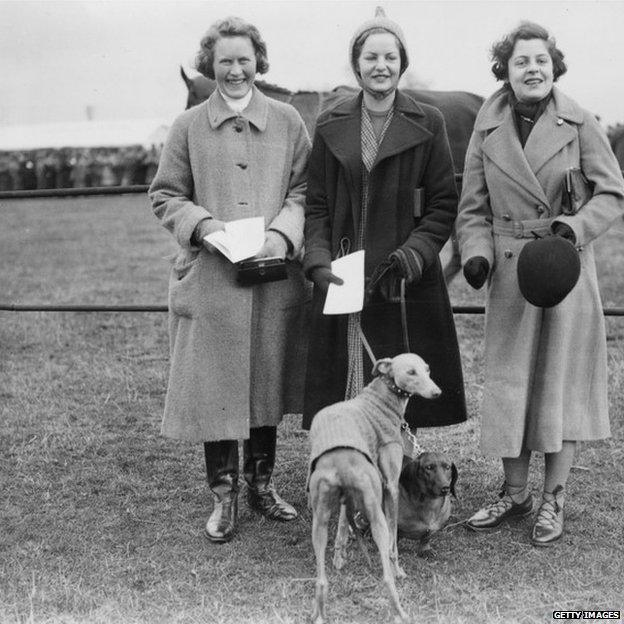
Deborah (c) was part of 1930s high society
Having studied at the Cordon Bleu cookery school in Paris, she married Andrew Cavendish in 1941.
The second son of the 10th Duke of Devonshire, he was then an officer in the Coldstream Guards and a noted amateur jockey.
"If it wasn't love at first sight, it was certainly attraction at first sight," she later wrote.
He unexpectedly became heir to the Devonshire estate after his elder brother, William - who had married John F Kennedy's sister, Kathleen - was killed by a German sniper in Belgium.
Death duties
She suffered heartbreak when her first child, born prematurely, died within hours in 1941. She would later lose two more children in the same way.
When her husband's father died in 1950, aged just 55, he left a vast estate and huge death duties, which would not have been due had he survived for another four months.
The new duke and his duchess took up their inheritance and the obligations that came with it, including a £7m tax bill.
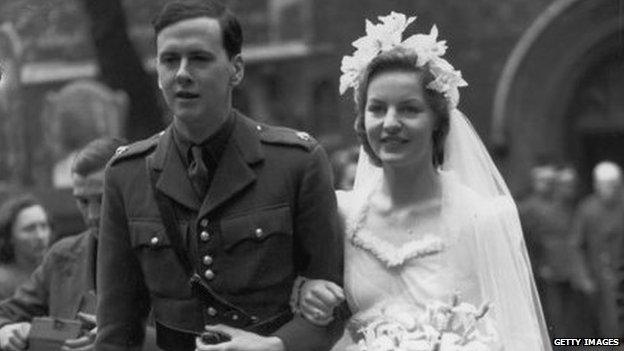
It was a wartime marriage
Against all the odds, the Devonshire estates remained remarkably intact, though Hardwick Hall was given to the National Trust.
And more than 50,000 acres of land, and a tranche of Old Masters - including Holbein's portrait of Henry VIII - had to be sold to meet the death duties.
A huge amount of work had to be done in the main house before the duchess and her husband, who had been living in Edensor House on the estate, finally moved to live in Chatsworth in 1959.
Parts of the house had been opened to the public in 1949 but a decision was taken to expand this business to raise the huge sums necessary to maintain the property.
Fascinating
The duchess became the driving force behind many of the enterprises such as the farm shop, gift shop and restaurant.
She set up the Farmyard in 1973 to show city children where their food came from, an idea that was way ahead of its time.
She also marketed her own food brand and opened a cookery school and furniture workshop as well as a number of highly regarded hotels.
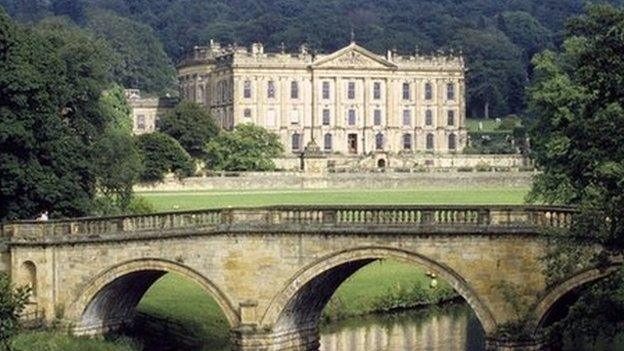
She was the driving force behind Chatsworth's success
"To me, the most fascinating part of retailing," she once said, "is seeing what people want, and to be able to up the taste a bit, instead of dumbing it down."
In 1974, with £21m raised by the sale of Poussin's Holy Family, the Devonshires set up the Chatsworth Trust, securing the house's future as home to arguably the greatest private art collection in the UK.
Filled to the brim with works by Rembrandt, van Dyck, Lucien Freud and boasting Canova's bust of Napoleon, the estate now pays its way.
The marriage remained a happy one, despite the duke's serial philandering, and his alcoholism, which he finally overcame in the 1980s.
'Beauty at every turn'
"He may have been difficult at times," she once said. "But he was never boring."
During her years at Chatsworth, the duchess was a hostess in the grand manner, entertaining everyone from members of the Royal Family to her husband's cousin, Harold Macmillan, and Sir John Betjeman.
When the duke died in 2004, the now dowager duchess remained at Chatsworth for 18 months before moving to a house on the estate.
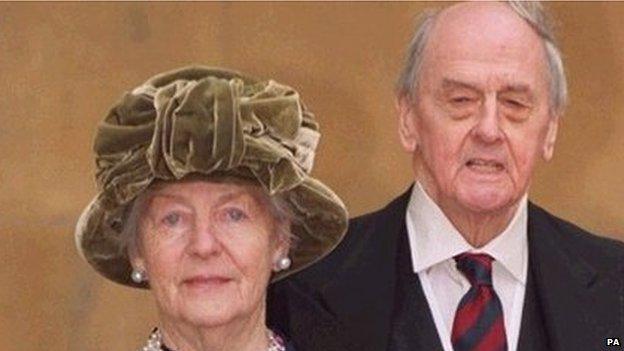
Her marriage survived her husband's infidelities
She was realistic about the move, made to give her son Stoker, the new duke, room to create his own life.
"Nothing belongs to the person," she said. "It all goes with the title. I've lived in furnished rooms since I was married."
At the age of 90 she published her own account of her upbringing because she felt the media had portrayed her family unfairly.
Wait For Me: Memoirs of the Youngest Mitford Sister shines a light on the vanished world of high society, debutantes and their delights and the traumas of World War Two.
Deborah Devonshire was an insightful literary reviewer, an outspoken defender of hunting and a longstanding fan of Elvis Presley.
She never stopped loving her family home.
"In all those years I never took the place for granted but marvelled at it and the fact we were surrounded by beauty at every turn."
- Published24 September 2014
